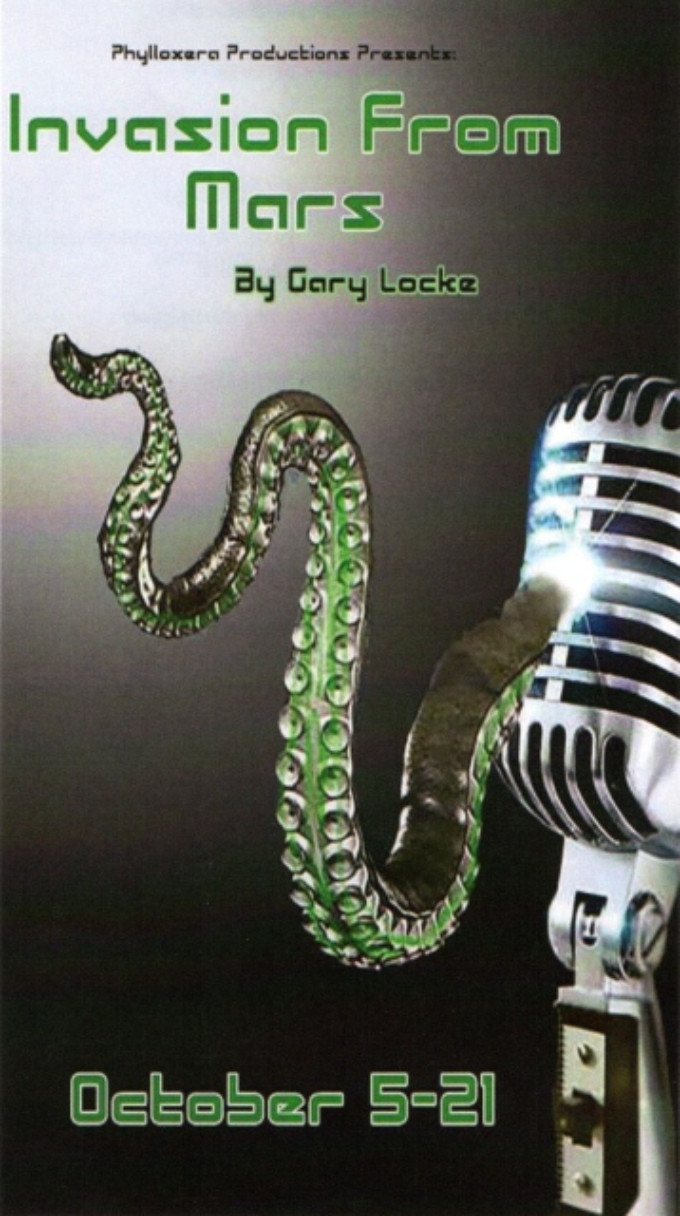Review: INVASION FROM MARS at Hatbox Theater

On October 19th, I had the pleasure of being transported to 1938, New Jersey, in Phylloxera Production's presentation of Invasion from Mars, by Gary Locke. Mounting the production at the Hatbox Theatre in Concord, NH, this group kept the audience engaged from beginning to end. Exploring the live broadcasting of a radio adaptation of H.G Wells' War of the Worlds and the phenomenon of isolated cases of panic caused by the distressing nature of the story, Invasion from Mars forces the company to handle the largest theatrical question of all stage adapted radio plays: How do you keep an audience entertained in a show that focuses on words and not actions? Phylloxera Production's solution: Stay present and keep the action in the background. Supported by the set, lighting, and mostly the performers themselves, Invasion from Mars kept the audience on the edge of their seats.
Given the condensed size of the Hatbox stage, Phylloxera Productions had a lot to put on stage and not a lot of space to put it. The upstage half of the set contained a booth, which housed counter space and the studio telephone, and the studio, which held a table with chairs for the performers, a central microphone, and upstage left a stool for Orson Welles. Downstage right were two small chairs and an end table with an old radio, while downstage left held two lavish chairs and a newer, more stylish radio. Despite these cramped quarters, the staging was smartly done and kept downstage center clear for playing space. Throughout the performance, the different groups- the radio performers, Grover's Mill residents, a Chicago family, and Emma Washburn- use this shared space to build upon the space inherent in their portion of the set.
Despite keeping the action focused in these specific settings, making it easier for the audience to follow the action, the lighting did a very good job subtly highlighting the physical action to guide the audiences' eyes. The lighting was, mostly, restricted to illuminating the stage in order to be seen, with very little spectacle lighting being used. This restriction ended up being beneficial to the production, for when the lighting broke out of this simplistic convention to grow a bold red, white, and blue for a very drunken patriotic declaration, the audience felt roused and invigorated to match the performers.
Speaking of the performers, who arguably had the hardest obstacles in this production, they managed to impress even this keen-eyed actor/director with their intense focus and commitment to character. While every character did a superb job remaining present and focused, even when they weren't the active scene at the time, there are a few notable actors who stood out and brought the show to a new level: The sound technician, Dan Seymour (Played by Andrew Burke), had a relatively background role, spending most of his time in the booth or reading a spare role or two, which gave him more time to interact with John Houseman and Annie Froelich, Aaron Compagna and Karielle Anzaldi respectively.
While he was trying to run sound for the radio show, he had to deal with Aaron and Karielle holding arguments in the booth over the fact that they have been receiving phone calls demanding the broadcast to make a disclaimer as they are getting reports of individuals believing that the broadcast was really happening. Dan spent the entire show slowing getting more and more irritated until, during a particularly boring conversation in Act 2, he explodes and begins yelling aggressively in the booth at the other two. Despite being a background moment, it quickly took center stage as the audience erupted into laughter, overlapping the conversation which, rightfully, was meant to take the backseat. Such a subtle build up on Burke's part enhanced that final outburst because it felt so natural and fluid in the moment.
In a more prominent role, one of the residents of Grover's Mill- the town where the "Invasion" starts- named Buster Ouellette, played by Tim Mitchell, was an entirely different acting challenge. Not only is it hard to remain focused on listening to a radio while the lights are on a different scene, but Mitchell had to do that while also performing as being drunk. The subtle ticks of being drunk, like stumbling over words or losing balance, is hard to keep up when one isn't actively expressing it, let alone keeping it up while staring at a radio.
This combination of a concise set, simplistic lighting, and superb acting made a simple stage adaptation of a radio play into an attention-grabbing, captivating, and comedic adventure that kept the audience laughing and on the edge of their seats for the entire show. Phylloxera Production's presentation of Gary Locke's Invasion from Mars was expertly staged and performed and the actors' knowledge of the script and comfort with each other was evident and made for a wonderful experience from beginning to end.
Reader Reviews

Videos

